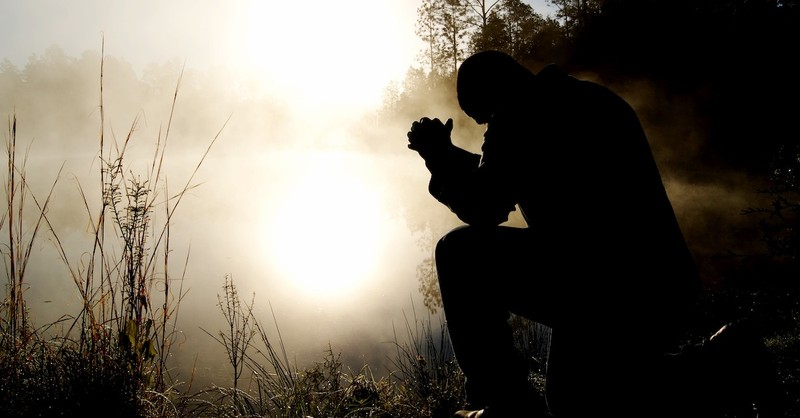
I read the text over and over again, hoping the words would somehow change. But they didn’t. It was the third time my husband and I had heard this dreaded word during the past year. This word we wanted to wish away: cancer. This time it was my father-in-law, and while we didn’t know the details yet, we knew surgery was imminent.
If you ask any parent what their daily prayers include, most of them would name protection as part of the list. Protection of their kids is first and foremost, but also protection over their families, friends and even themselves. But the longer we walk through this life, the more we realize those prayers aren’t always answered. Or at least, they aren’t always answered in the way we think they should be.
This text from my husband was one of the many instances where a loved one walked through a fire that we could not protect them from. It was outside of our control. And since God allowed him to come to it, we had to trust him to walk with him through it. We had to believe that even though this dreaded word was allowed to enter our family’s lives once again, that somehow God would redeem this situation.
Have you ever wondered why God didn’t answer your prayers for protection? Perhaps you watched a child or loved one walk through pain and suffering, and it nearly broke you to know you couldn’t take it away. Or perhaps you’re dealing with your own pain or heartbreak, and it feels as though you’re barely hanging on. I think it’s natural for us to have questions in these situations. All we have to do is look at the Psalms to see that following God doesn’t mean our questions go away. Often, our questions can lead us to an even deeper faith.
The key is to continue communicating with God, even in our questions. Even when we don’t receive the answers we want, we have to keep coming to him. Here are three reasons why God doesn’t always answer prayers for protection:
Photo Credit: © Unsplash/Cherry Laithang

1. God wants to use you to deliver someone else from bondage.
One of my favorite redemption stories in the Old Testament is the story of Joseph. I’m sure Joseph would have preferred to not be sold into slavery by his brothers. But he was. And after this initial betrayal, he was betrayed again and imprisoned for a crime he never committed. He spent years in prison, and when he helped those around him, he was forgotten. But even in what looked like insurmountable odds, God was working. He later used Joseph to not only serve the king, but to save the entire nation of Israel. He also redeemed the relationship between Joseph and his brothers, and brought them to repentance.
Joseph recognizes that by not protecting him from his brothers’ schemes, God accomplished a greater purpose.
“You intended to harm me, but God intended it for good to accomplish what is now being done, the saving of many lives.” (Genesis 50:20)
Joseph could have easily become bitter toward God for not protecting him from hardship, but he remained faithful. He kept seeking God and serving him in the middle of adversity, and God rewarded him.
Photo Credit: © Getty Images

2. God wants to do a work in you before he lifts the burden for you.
Have you ever watched someone blow glass? It is a breathtaking sight to behold, and several years ago I had the opportunity to watch an artist at work. The material was heated thousands of degrees to become pliable enough to mold into a piece of art, but the artist’s time to shape it was limited. If it dropped below a certain temperature, the material hardened and was impossible to work with.
In the same way glass needs to be a hot fluid to respond to the glassblower’s touch, the trials of life often make us more sensitive to God’s hand. Suffering draws us into a dependence on God like nothing else, because we realize how much we need his presence in our situation. We become desperate for his comfort and tangible movement in our lives, and our faith can grow in ways it never had before. When we suffer, we become more like Jesus, and we’re able to know him on a deeper level.
Paul talks about his inward spiritual transformation in his letter to the church at Corinth, and exhorts them not to become discouraged when the troubles of this life come.
“Therefore we do not lose heart. Though outwardly we are wasting away, yet inwardly we are being renewed day by day. For our light and momentary troubles are achieving for us an eternal glory that far outweighs them all.” (2 Corinthians 4:16-17)
However, the opposite can also be true. We can distance ourselves from God instead of seeking him in our circumstances. We may see our situation as evidence of God’s negligence instead of looking for the ways he’s with us through it. The choice is up to us.
Photo Credit: © Unsplash/Aaron Burden

3. God wants to show that he still moves through our prayers.
I know, this may seem contradictory, right? But if we were never allowed to walk through valleys in this life, we would never need to call on God to deliver us. The valleys of life cause us to seek God in prayer, to rally the saints around us, and to wait for God to move. And he does. It just isn’t always on our timeline.
In the gospel of John, Jesus and his disciples encountered a blind man. The disciples immediately assumed the man’s affliction was the result of sin — either the blind man’s or his parents. They asked Jesus who sinned, but Jesus gave them a response they weren’t expecting.
“Neither this man nor his parents sinned,” said Jesus, “but this happened so that the works of God might be displayed in him.” (John 9:3)
If this man had been protected from blindness, Jesus wouldn’t have had the opportunity to heal him. And because of this healing, others were able to see his power at work and put their hope and trust in him.
Many times, we don’t see the ways our stories overlap into the lives of others. But our stories are never just about us. God wants to use our stories as a living testimony of his goodness and grace, and to use them to draw others into his presence. When we aren’t allowed to walk through some difficult seasons, his opportunities to do this become limited because we still live in a fallen world. Humanity isn’t perfect, and when they see perfection in our own lives, it can actually be a deterrent rather than something that draws them closer.
However, when they see followers of Christ walking through troubles just like they are, our stories become invitations. They might see our peace in the midst of chaos or the way God is carrying us through it, and want to know more. A unique opening for God’s love to reach someone is created because of something we wanted to skip over.
Are you walking through a dark valley right now, and wondering why God didn’t protect you from it? Or perhaps, like me, you’re watching a loved one walk through it, wishing they didn’t have to. It is human to ask questions and to experience moments of frustration. But don’t let the enemy keep you there. Allow your point of weakness to be a propellant toward the Lord’s strength. He is not finished with your story, and this season is not a result of his anger or negligence toward you.
He will use this chapter as a bridge into something greater, something you can’t quite see yet. Keep putting one foot in front of the other, and keep seeking his hand in the middle of your situation. One day you will look back and see evidence of his fingerprints all over it.
Photo Credit: © Unsplash
Originally published Thursday, 18 March 2021.









